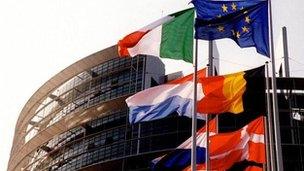The European parliament: A tale of two cities
- Published

Even Europhile MEPs don't think they need to meet in two place
At the European parliament's gift shop, you can buy t-shirts proclaiming "I Love Strasbourg".
It's a lovely city. But you won't find many MEPs who love their monthly trip there.
Twelve times a year they and their staff pack up, load their luggage and paperwork on to chartered trains and make the 250-mile trip from Brussels to the parliament's sprawling complex of buildings in Strasbourg.
All the main parties contesting this election in Wales would like to stop the shuttling back and forth.
Kay Swinburne, who is defending her seat as the Conservatives' lead candidate in Wales, has amassed plenty of miles on the route between Belgium and eastern France.
'Waste'
"Having had to do this journey for five years now it really is completely pointless," she says.
"But it's not just a waste of money which is running in to hundreds of millions every year - it's also the fact that actually the disruption to the work programme is enormous."
Strasbourg is where the parliament's plenary sessions are held - the place where it votes on all the big decisions.
MEPs like Dr Swinburne might prefer to do that in Brussels, but they know that it would require a unanimously-agreed treaty change to pull out of the French city.
So the shuttling back and forth continues.
While I was there, MEPs were voting on all manner of things that could affect us in Wales.
There were motions condemning violence against women and approving new rules to clamp down on tobacco products such as e-cigarettes.
The parliament also approves the EU budget - currently worth more than £110bn a year.
Wales gets a slice of that, including through billions of pounds of structural funds to help the economy.
But MEPs don't spend the money - that's done back home by the Welsh government.
And despite the investment on offer, the size of the economy in the poorest parts of Wales has fallen further behind the European average.
"I think we'd probably worse off without that money," says Labour's Derek Vaughan, the party's lead candidate in Wales.
Power
He says that by arguing Wales's case in Strasbourg and Brussels, he's been able to secure more money for Wales.
But Mr Vaughan admits it was a lot easier to get things done in his old job as the leader of Neath Port Talbot council.
That's one of the things that strikes you in Strasbourg - it's not always clear where power lies.
There's no figure equivalent to the Prime Minister or First Minister in Strasbourg's vast dome-like debating chamber.
Members sit in big multi-national groups. It all creates a very different political culture from those of Wales and Westminster.
Plaid Cymru's Jill Evans has been an MEP for 15 years and is standing for re-election. She says she tries to connect with voters through campaigning on the issues they care about.
"I would say the biggest single issue that constituents contact me about is animal welfare," she says.
"People are really concerned about this and they know it's at this level in Europe that these are legislated on and this is where we can do something about them."
Nathan Gill is UKIP's lead candidate in Wales. He's very likely to get elected, according to the opinion polls.
His party's policy on the EU is clear - pull out. But if he finds it so objectionable, why does he want to be a member of the European parliament?
"Because up until now, for the last 40 years, Britain has been sending pro-EU MEPs there," he said.
"And it's only since UKIP MEPs have been going to Brussels that we've been able to bring back the reality of what's been going on there in our name."
The man man who hopes to become the Liberal Democrats' first Welsh MEP - Alec Dauncey - doesn't agree.
'Reform'
But he says he welcomes the debate about our relationship with Europe that this election has sparked.
"The debate is clear and I think it's good that actually we are having this election about European issues," he said.
"Because so often politicians fight every election on everything and on this occasion we really are talking about the issue that can be dealt with by the people who are elected to go to Brussels to reform it as well."
You might have seen or heard the adverts appealing for you to vote on May 22. Fewer than a third of Welsh voters took part last time.
But the European parliament's publicity machine is only one factor in whether we vote. Perhaps a much bigger factor is what's said and done by the candidates who want to go there.